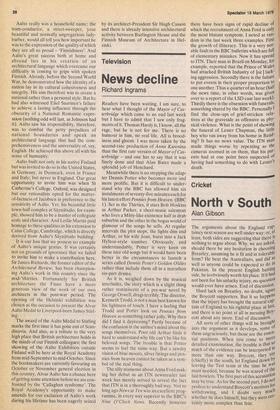Television
News decline
Richard Ingrams
Readers have been waiting, I am sure, to hear what I thought of the Mayor of Casterbridge which came to an end last week but I have to admit that I saw only fragments of it. Thomas Hardy is, I know, all the rage, but he is not for me. There is no humour in him, no real life. All is broodiness and gloom. I was more taken by the second-rate production of Anna Karenina than the first rate version of Mayor of Casterbridge — and one has to say that it was finely done and that Alan Bates made a splendid job of Henchard.
Meanwhile there is no stopping the adapter Dennis Potter who becomes more and more prolific. But it is difficult to understand why the BBC has allowed him six instalments of seventy-five minutes each for his latest effort Pennies from Heaven. (BBC 1). Set in the Thirties, it stars Bob Hoskins as Arthur Parker, a sheet-music salesman who lives a Mitty-like existence half in drab suburbia and the other in the bogus world of glamour of the songs he sells. At regular intervals the plot stops, the lights dim and Arthur, or his wife Joan, burst into a Jack Hylton-style number. Obviously, and understandably, Potter is very keen on these nice old songs but it would have been better in the circumstances to launch a series called Dennis Potter's Golden Oldies rather than include them all in a marathon six-part drama.
As it is, weighed down by the musical interludes, the story which is a slight thing rather reminiscent of a pre-war novel by George Orwell, drags terribly. The director, Kenneth Trodd, is not a man best known for his lightness of touch. I have a feeling that Trodd and Potter look on Pennies from Heaven as something rather jolly. Why then did I find it depressing? Partly because of the confusion in the author's mind about the songs themselves. Poor old Arthur finds it hard to understand why life can't be like his beloved songs. The trouble is that Potter seems to feel the same way. But a tawdry vision of blue moons, silver linings and pennies from heaven cannot be taken as a symbol of the real thing.
The silly nonsense about Anna Ford making her debut as an ITN newsreader last week has merely served to reveal the fact that ITN is in a thoroughly bad way. Not so long ago News at Ten was an excellent prog ramme, in every way superior to the BBC's Nine O'Clock News. Recently however
there have been signs of rapid decline of which the recruitment of Anna Ford is only the most blatant symptom. I noted at random in the last week three examples. First the growth of illiteracy. This is a very not' able fault in the BBC bulletins which are full of elementary mistakes. Now it has spread to ITN. Their man in Brazil on Monday, for example, reported that the Prince of Wales had attacked British Industry of [sic) lacking aggression. Secondly there is the failure to put events in their proper proportion to one another. Thus a quarter of an hour (half the news time, in other words, was given over to a report of the LSD case last week). Thirdly there is the obsession with funerals, something shared by the BBC. Personally find the close-ups of grief-stricken relatives at the graveside as offensive as phr sical violence. What is the point of showing the funeral of Lester Chapman, the little boy who ran away from his home in Reading? It has no news value. The ITN man made things worse by repeating as the cameras zoomed in on them, that his parents had at one point been suspected of having had something to do with Lester s death.


































 Previous page
Previous page